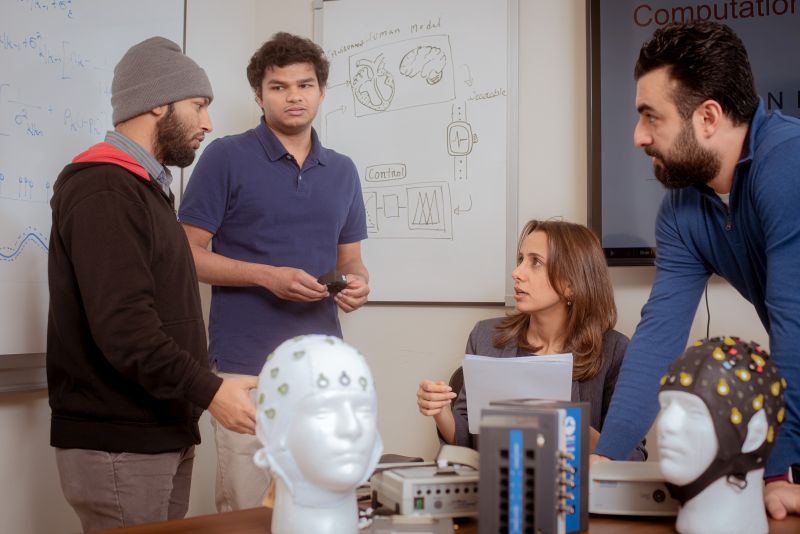A pair of Cullen College of Engineering students are among 21 nationwide that gave live presentations at the National Science Foundation’s Cyber-Physical Systems (CPS) Principal Investigators’ meetings from June 2 through June 4.
The NSF CPS PI meeting brings together PIs whose research is funded by the CPS program to give presentations on the progress of their grants. This year the CPS PI meeting was held virtually, and for the first time, featured graduate student presentations.
Doctoral students Rafiul Amin and Hamid Fekri Azgomi are both advised by Rose Faghih, Ph.D., Assistant Professor of Electrical and Computer Engineering and the Director of the Computational Medicine Laboratory (CML). Under the supervision of Dr. Faghih, the duo prepared a demonstration on CML’s MINDWATCH research for the meeting, which is viewable on YouTube.
Both Amin and Fekri Azgomi said they were honored to be selected to present.
“It is a huge platform where all the PIs around the country came to present their work,” Amin said. “My selection means my work is relevant and interesting enough among the cyber-physical-systems community to be selected from only 21 graduate students around the country.”
He added, “Attending many talks and poster presentations enable me to have the big pictures of many CPS projects across different applications. It gave me an idea about the things that matter the most in general for CPS systems. Further, we could have an idea about the direction the research community is heading towards to address the most pressing challenges. Now I feel I have a better understanding of how my future research directions should be prioritized.”
“It was a great opportunity for me to participate in the PI meeting and present my research to a professional community,” Fekri Azgomi said. “As our lab’s funding for this project comes from the cyber-physical systems program at NSF, it was a great chance for me as a graduate student to present the outcome of my research for the principal investigators in this program. I observed how my field of research is on the edge of science and could impact society.”
Fekri Azgomi and Amin noted that participating in the meetings would have a positive effect on their professional and personal development.
“As a graduate student who has the dream to develop my career in academia, it was an excellent experience for me to know frontiers in the field and get more familiar with a diverse range of research topics in my field of expertise,” Fekri Azgomi said, adding, “I believe this experience led me to identify new fields of research and diversify my professional career. Getting involved in research discussions with professors and leaders with different backgrounds helps me expand my field of research and learn to present it to a broader community. Attending lightning talks and poster sessions taught me how to showcase my research.”
Amin added, “I was able to see some cool projects and was able to interact with the PIs. Further, I saw how the PIs around the country could compress their five-year-long projects within a 90-second presentation, and yet were able to convey the key ideas. I think this experience will help me in general to present my research more efficiently.”
For Amin, the highlight of the experience was being exposed to different projects and findings in the field.
“Sometimes, I feel that we are so involved in our research that we sometimes are biased within our domain,” he said. “It was very important, especially for me, to attend this to look at different perspectives within different projects.”
This also led to him receiving feedback on his own projects.
“As not all CPS PIs work on applications similar to ours, we have received some great questions that reveal how researchers from other domains evaluate our research,” Amin said. “We saw how similar methods that we use in biomedical signal processing are being used in other applications such as power systems. It allowed me to think more out of the box to utilize some of the methods developed in our lab to be able to apply them in other domains as well. Finally, it was a great experience to be able to communicate our research and to be able to see many interesting and groundbreaking ideas in a variety of applications.”
Fekri Azgomi cited the feedback from professionals in the field, as well as the diversity of the critiques, as being important to him.
“The key features of this experience were presenting the outcome of my Ph.D. research for the professional community and having their feedback, getting to know the leaders in the field, identifying novel fields of research and learning how to present the grant outcome, and getting feedback from the leaders,” he said. “Participating in multiple sessions such as ‘Diversity, Equity and Inclusion’ and ‘Research Experiences for Undergraduates’ panel discussions helped me learn more about these important topics, and will definitely lead me to develop my future research plans in a more efficient way and for a broader community.”
He added, “I believe being selected as one of the graduate student presenters in the PI meeting provided me the opportunity to get feedback about my research progress, network with other experts in my field of research and identify high-demand problems.”
